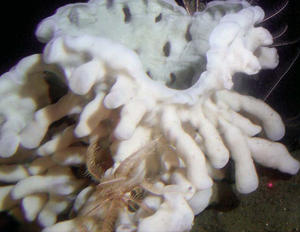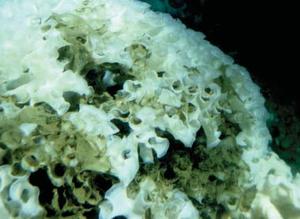Protecting the Glass Sponge Reefs from offshore oil and gas

Lifting the 30-year moratorium on offshore oil and gas exploration and development could devastate the fragile glass sponge reefs in the Queen Charlotte Basin. Growing on the seafloor for over 9000 years, these globally unique sponge reefs are found only in BC.
Oil and gas exploration and development may destroy the world’s last chance to study, appreciate and understand this beautiful and ancient biological phenomenon.

Dr. Manfred Krautter, University of Stuttgart Dixon Entrance
Please help prevent offshore oil and gas exploration and development from destroying the irreplaceable glass sponge reefs. See page 8 to find out how.
The Hecate Strait Glass Sponge Reefs – Living Dinosaurs Thought to have gone extinct during the age of the dinosaurs, the first known living glass sponge reefs in the world have been discovered living in the waters off the coast of British Columbia.
The Hecate Strait sponge reefs live at depths of up to 250 meters and are among the largest biotic structures on earth. Four sponge reefs that have been discovered in the Strait, forming reef complexes up to 300 km2 and covering a total area of over 700 km2. These glass sponge reef communities have been growing on the seafloor for over 9000 years. They are the only known example of glass sponge reefs worldwide. They have been nominated for World Heritage Status through the United Nations Educational, Scientific and Cultural Organization (UNESCO) because they represent a part of the world’s natural history and heritage.
The Sponge Reefs Need to be Protected

These globally unique and fragile reefs are currently threatened. The leading Canadian sponge reef scientist estimates that only 50% of the reefs remain.
Trawling has destroyed the rest. Trawl fishery closures were finally put in place in 2002 to protect the reefs. However, despite these closures, new damage to the most pristine part of the reefs has been discovered. Unfortunately, trawling and other activities, including proposed oil and gas exploration, continue to pose threats to the reefs.
A federal process is currently underway to consider lifting the moratorium for offshore oil and gas in the Queen Charlotte Basin/Hecate Strait region where the sponge reef communities exist. Lead scientists warn that potential impacts from offshore oil and gas threaten the continued survival of the sponge reefs. If the moratorium is lifted, exploration and development activities will pose significant risks to this exceptional, biologically productive and diverse ecosystem.
“We know from the fossil record the sponges reefs are very sensitive organisms which need long-time stable environmental conditions… Given the known sensitivity of the sponges to increased sedimentation, I am concerned that exploration drilling which increases the suspended sediment concentration in the water, will pose severe threats to the survival of the reefs. In addition, hydrocarbon pollution can devastate the sponges.” Dr. Manfred Krautter, University of Stuttgart
Impacts of Offshore Oil and Gas on the Glass Sponge Reefs

Only discovered in the late 1980s, very little research has been conducted on the biology and ecology of the unique and mysterious sponge reef communities. There is very little knowledge of the biology of the individual glass sponges and on the ecology and dynamics of the reef ecosystem. We don’t even have a basic understanding of how the sponges reproduce, which means we also don’t know whether they can recover from disturbance.
We do know from the fossil record that the sponges are very sensitive organisms that need long-time stable environmental conditions. Because the sponge reefs are unique world wide, the waters of BC provide the only possibility to study these ancient organisms and ecosystems.
Dr. Manfred Krautter from the University of Stuttgart is a lead scientist on glass sponge reefs. In his submission to the expert panel on science issues related to oil and gas activities in offshore British Columbia, he outlined the possible impacts of oil and gas exploration and development on the sponge reefs. For the full report see: http://www.cpawsbc.org/action/sponge/Krautter_OOG.pdf
The possible impacts of oil and gas exploration and development on the sponge reefs:
- The sponge reefs are very sensitive to increased sedimentation. By increasing the suspended sediment concentration in the water, oil drilling poses severe threats to the survival of the reefs which need areas of low sediment input to survive.
- Seeping of crude oil and gas is lethal to these sensitive animals that need long-term constant environmental conditions. Hydrocarbon pollution can devastate the reefs. Dense populations of glass sponges are known to exist only in pristine environments.
- The tolerance of the glass sponges for noise from seismic exploration is unknown.
- Even if an oil spill is not in the direct vicinity of the reefs, they may still be negatively affected, even poisoned by filter feeding on contaminated nutrient transported from an oil spill site to the reefs by ocean currents.
Process to Consider Lifting the 30-Year Moratorium on Offshore Oil and Gas In British Columbia
The Government of British Columbia requested that the Government of Canada consider lifting the moratorium on offshore oil and gas. In response, the Minister of Natural Resources Canada instigated a three-stage review process which will:
- identify the science gaps related to oil and gas activities
- hear the public views on whether or not the moratorium should be lifted
- consult with First Nations

The Royal Society of Canada was commissioned with the first phase of this process. The Report of the Expert Panel on Science Issues Related to Oil and Gas Activities, Offshore British Columbia was released in February 2004. This report acknowledged the importance of the sponge reefs and recommended that “in light of their unique nature the sponge reefs in the Queen Charlotte Basin be officially designated as Marine Protected Areas as soon as possible” However, without adequate science, it is irresponsible to assume that seismic testing, as well as other oil and gas activities, will not adversely affect and possibly destroy the sponge reefs, even if a marine protected area is established around them.
Marine protected areas are important, but not enough to protect the sponge reefs from offshore oil and gas
Marine protected areas (MPAs) are designated regions within the marine environment with long-term legal protection. They can range from small, highly-protected “no take” areas, where no human activities are permitted, to large, zoned areas that can accommodate a broad spectrum of human activities.
Marine protected areas are an important tool for marine conservation. They can provide many ecological benefits and can protect the marine environment from some risks. However, they cannot entirely prevent the harmful environmental effects of some human disturbances that are easily dispersed by the dynamic and fluid marine environment.
MPA status for the sponge reefs is necessary and will help protect this unique ecosystem. However, this will not ensure that the sponges are safeguarded against the impacts resulting from oil and gas activities, including the impacts of oil spills, increased sediment rates, noise and contaminated toxic nutrients.
Broader concerns about lifting the moratorium on offshore oil and gas
- Offshore oil and gas is risky, expensive and polluting.
- The Hecate Strait/Queen Charlotte Basin commonly experiences severe natural disturbances including severe storms, winds, waves and earthquakes. This significantly increases the risk of a major oil spill.
- Due to its enclosed nature, oil will be trapped in the basin in the event of a spill. The oil will inevitably impact one of the surrounding coastlines.
- The marine mammals, sea birds, fish, invertebrates and vegetation that make up this ecologically rich marine environment can be devastated by seismic exploration and oil production and distribution.
- The promise of jobs for coastal communities is misleading. Most companies are likely to bring in trained, expert staff while current local employment in tourism, and sports and commercial fishing will be threatened by the impacts of oil and gas activity.
- Producing and burning oil and gas causes climate change which threatens all life on this planet.Climate change is already affecting Canadian climate: more droughts and heat waves; an increase in the frequency and severity of extreme weather events; dropping water levels and more serious smog episodes. A more sustainable energy strategy would keep the moratorium in place and focus on the development of energy alternatives to meet our energy needs.
